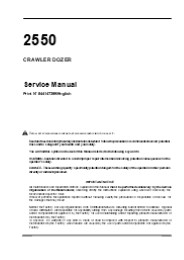Rough Idling And Excessive Smoke PowerPoint PPT Presentations
All Time
Recommended
Worn valve stem seals in BMWs can lead to various engine issues if not addressed early. Common symptoms include blue-tinted exhaust smoke, excessive oil consumption, and a rough idle. You may also notice fouled spark plugs or a burning oil smell. Identifying these signs early helps prevent more severe engine damage and costly repairs, ensuring optimal performance and longevity.
| PowerPoint PPT presentation | free to download
Smoke on startup in a Porsche 911 is often caused by worn valve seals, piston rings, or oil seepage into the combustion chamber. This issue may occur after the vehicle sits idle, allowing oil to pool. Addressing these problems promptly can prevent engine damage and ensure smooth performance, keeping your Porsche running at peak efficiency.
| PowerPoint PPT presentation | free to download
If your VW Tiguan is experiencing excessive oil consumption, blue smoke from the exhaust, or engine misfires, it may be time to replace the oil separator. A failing oil separator can lead to poor engine performance and potential damage. Timely replacement ensures proper ventilation, preventing costly repairs and maintaining your Tiguan’s optimal efficiency.
| PowerPoint PPT presentation | free to download
A valve stem seal is not like other seals present in the AUDI’s engine. Rather it is a seal that allows a controlled amount of oil for the purpose of valve stem lubrication. When a valve stem seal goes bad, it will cause rough idling, high level of oil consumption, high exhaust smoke, acceleration power loss, etc. By performing a cold engine test, you can tell whether the valve stem seal is faulty or not. Better you hire a reputable AUDI professional, do inspections semi-regularly, and replace the valve stem seal whenever needed so that you can prevent your car from experiencing engine oil flooding.
| PowerPoint PPT presentation | free to download
BOBCAT 371 SKID STEER LOADER Service Repair Manual Instant Download
| PowerPoint PPT presentation | free to download
BOBCAT 371 SKID STEER LOADER Service Repair Manual Instant Download
| PowerPoint PPT presentation | free to download
John Deere 4100 Compact Utility Tractor Service Repair Manual Instant Download
| PowerPoint PPT presentation | free to download
Versatile 936 956 976 Tractors Operator’s Manual Instant Download (Publication No.42093631)
| PowerPoint PPT presentation | free to download
John Deere 8010 Diesel Tractor Operator’s Manual Instant Download (Publication No.OMR30814)
| PowerPoint PPT presentation | free to download
BOBCAT 371 SKID STEER LOADER Service Repair Manual Instant Download
| PowerPoint PPT presentation | free to download
John Deere 8020 Diesel Tractors Operator’s Manual Instant Download (Publication No.OMR37261)
| PowerPoint PPT presentation | free to download
John Deere 4100 Compact Utility Tractor Service Repair Manual Instant Download
| PowerPoint PPT presentation | free to download
John Deere 4100 Compact Utility Tractor Service Repair Manual Instant Download
| PowerPoint PPT presentation | free to download
John Deere 4100 Compact Utility Tractor Service Repair Manual Instant Download
| PowerPoint PPT presentation | free to download
Versatile 935 950 Tractors Operator’s Manual Instant Download (Publication No.42093520)
| PowerPoint PPT presentation | free to download
John Deere 4630 Tractor Operator’s Manual Instant Download (Publication No.OMR65495)
| PowerPoint PPT presentation | free to download
Versatile 935 950 Tractors Operator’s Manual Instant Download (Publication No.42093521)
| PowerPoint PPT presentation | free to download
Versatile 756 Tractor Operator’s Manual Instant Download (Publication No.42075611)
| PowerPoint PPT presentation | free to download
CASE 2550 Crawler Dozer Service Repair Manual Instant Download
| PowerPoint PPT presentation | free to download
John Deere 4030 Tractor Operator’s Manual Instant Download (Pin.6700-) (Publication No.OMR57252)
| PowerPoint PPT presentation | free to download
John Deere 4100 Compact Utility Tractor Service Repair Manual Instant Download
| PowerPoint PPT presentation | free to download
John Deere 2653B Trim and Surrounds Mower Operator’s Manual Instant Download (PIN040001-) (Publication No.OMTCU27760)
| PowerPoint PPT presentation | free to download
John Deere 8010 Diesel Tractor Operator’s Manual Instant Download (Publication No.OMR30814)
| PowerPoint PPT presentation | free to download
CASE 2550 Crawler Dozer Service Repair Manual Instant Download
| PowerPoint PPT presentation | free to download
John Deere 8020 Diesel Tractors Operator’s Manual Instant Download (Publication No.OMR37261)
| PowerPoint PPT presentation | free to download
Versatile 936 956 976 Tractors Operator’s Manual Instant Download (Publication No.42093631)
| PowerPoint PPT presentation | free to download
CASE 2550 Crawler Dozer Service Repair Manual Instant Download
| PowerPoint PPT presentation | free to download
CASE 780CK Loader Backhoe Service Repair Manual Instant Download
| PowerPoint PPT presentation | free to download
John Deere 1023E 1026R Compact Utility Tractors Operator’s Manual Instant Download (PIN010001-) (Publication No.OMLVU24604)
| PowerPoint PPT presentation | free to download
John Deere 4100 Compact Utility Tractor Service Repair Manual Instant Download
| PowerPoint PPT presentation | free to download
BOBCAT 371 SKID STEER LOADER Service Repair Manual Instant Download
| PowerPoint PPT presentation | free to download
John Deere 4105 Compact Utility Tractors Operator’s Manual Instant Download (PIN100001-) (Publication No.OMLVU19957)
| PowerPoint PPT presentation | free to download
John Deere 997 Mid-Mount Z-Trak™ Mower Operator’s Manual Instant Download (PIN055001-) (Publication No.OMTCU28110)
| PowerPoint PPT presentation | free to download
John Deere 4030 Tractor Operator’s Manual Instant Download (Pin.6700-) (Publication No.OMR57252)
| PowerPoint PPT presentation | free to download
John Deere 4630 Tractor Operator’s Manual Instant Download (Publication No.OMR65495)
| PowerPoint PPT presentation | free to download
Versatile 936 956 976 Tractors Operator’s Manual Instant Download (Publication No.42093631)
| PowerPoint PPT presentation | free to download
John Deere 8020 Diesel Tractors Operator’s Manual Instant Download (Publication No.OMR37261)
| PowerPoint PPT presentation | free to download
Case IH 686 and Hydro 86 Tractors Operator’s Manual Instant Download (Publication No.1084556R2)
| PowerPoint PPT presentation | free to download
John Deere 1026R Compact Utility Tractors Operator’s Manual Instant Download (PIN010001-) (Publication No.OMLVU23521)
| PowerPoint PPT presentation | free to download
John Deere 1600 Turbo Wide Area Mower Operator’s Manual Instant Download (PIN TC1600T050001-) (Publication No.OMTCU27188)
| PowerPoint PPT presentation | free to download
John Deere 2940 Tractor Operator’s Manual Instant Download (Publication No.OMR71860)
| PowerPoint PPT presentation | free to download
John Deere HPX 4×4 Diesel GATOR™ Utility Vehicle Operator’s Manual Instant Download ( PIN090001-) (Publication No.OMM163327)
| PowerPoint PPT presentation | free to download
John Deere 4100 Compact Utility Tractor Service Repair Manual Instant Download
| PowerPoint PPT presentation | free to download
John Deere 4100 Compact Utility Tractor Service Repair Manual Instant Download
| PowerPoint PPT presentation | free to download
John Deere 400 Hay Cuber Operator’s Manual Instant Download (Publication No.OME40431)
| PowerPoint PPT presentation | free to download
John Deere 4100 Compact Utility Tractor Service Repair Manual Instant Download
| PowerPoint PPT presentation | free to download
John Deere Worksite GATOR Utility Vehicle Operator’s Manual Instant Download (PIN001001-) (Publication No.OMM144136)
| PowerPoint PPT presentation | free to download
Ford LGT18H Garden Tractor Operator’s Manual Instant Download (Publication No.42001811)
| PowerPoint PPT presentation | free to download
John Deere 8020 Diesel Tractors Operator’s Manual Instant Download (Publication No.OMR37261)
| PowerPoint PPT presentation | free to download
Ford YT16 Yard Tractor Operator’s Manual Instant Download (Publication No.42001614)
| PowerPoint PPT presentation | free to download
Case IH 686 and Hydro 86 Tractors Operator’s Manual Instant Download (Publication No.1084556R2)
| PowerPoint PPT presentation | free to download
Kobelco ED195-8 TIER 3 EXCAVATOR DOZER Service Repair Manual Instant Download (Book Code No. 87693703 NA)
| PowerPoint PPT presentation | free to download
New Holland D150 Crawler Dozer Service Repair Manual Instant Download 1
| PowerPoint PPT presentation | free to download
John Deere 2940 Tractor Operator’s Manual Instant Download (Publication No.OMR71860)
| PowerPoint PPT presentation | free to download
Case IH International 4386 and 4586 Tractors Operator’s Manual Instant Download (Publication No.1084586R2)
| PowerPoint PPT presentation | free to download
CASE 780CK Loader Backhoe Service Repair Manual Instant Download
| PowerPoint PPT presentation | free to download
























































